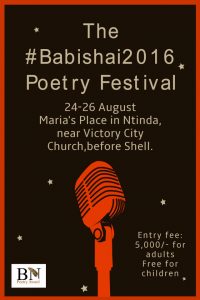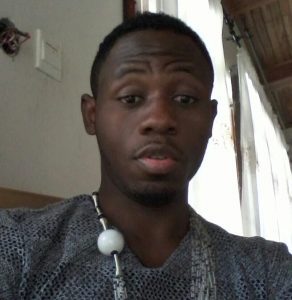
Courtesy photo
Davis Tashobya is the immediate past President of Kampala Toastmasters Club and a public speaking trainer in Kampala. He will also be participating in the Toastmasters Challenge at the #Babishai2016 Poetry Festival on 25 August.
How long have you been a member of Kampala Toastmasters and what significant change has it made on your life?
I have been a Toastmaster since September 2010 when I moved to Nairobi.
When I moved back to Kampala permanently in 2014, together with a few other like-minded Toastmasters from clubs I knew in Kenya, we started Kampala Toastmasters.
Toastmasters has taught me everything I know about communication and leadership and then some. I have been able to nurture and develop some very strong and meaningful networks and made lots of friends along the way.
When you think of Ugandan poetry, what comes to mind?
Okot,P’Bitek. As a literature student, I drank from the fountain that is ‘Songs of Lawino” It left an indelible mark on me and I must admit though I haven’t been keen to read up more on the new stuff being churned out in Ugandan poetry, I enjoy poetry recitals and like the new crop of young poets like Jason Ntaro, Peter Kagayi, Aujo Lillian, to mention but a few.
The Babishai Poetry Festival is going to host the first Toastmasters challenge. A battle of words between poets and public speakers. As a competitor, how will you prepare for the challenge?
I will rehearse, rehearse and then rehearse. If I could, I would go on top of a mountain and prepare day and night while shouting into the wilderness because I know this won’t be an easy challenge but I plan on giving those poets a run for their money.
Do you feel that professionals in the work space need to interact more with poets?
Absolutely, if for nothing else at least some of the poet’s creativity could rub off onto them. I think most professionals could benefit from a huge dose of creativity.
How important is an education that includes creative arts?
I think it is extremely vital. The study of the creative arts inevitably gives birth to some of this world’s most prized artefacts, books, paintings and even when applied in the sciences it can help put into perspective various phenomenon,
Any parting remarks?
I think all poets should sign up to be Toastmasters. They fit the billing with astounding accuracy.
Thank you Davis.
The next Kampala Toastmasters Club meeting is on Tuesday 26 August at Protea Hotel from 6:00pm

